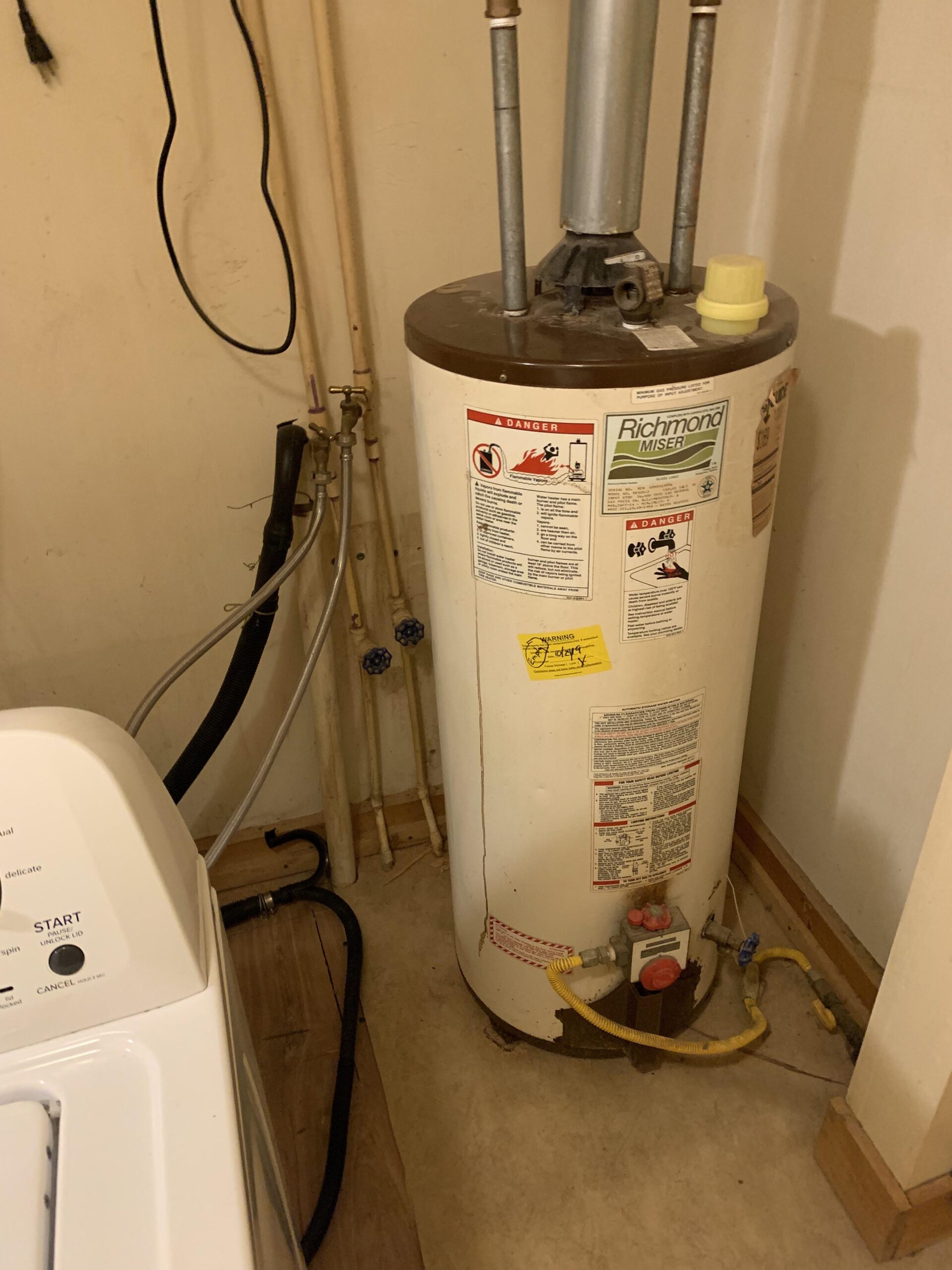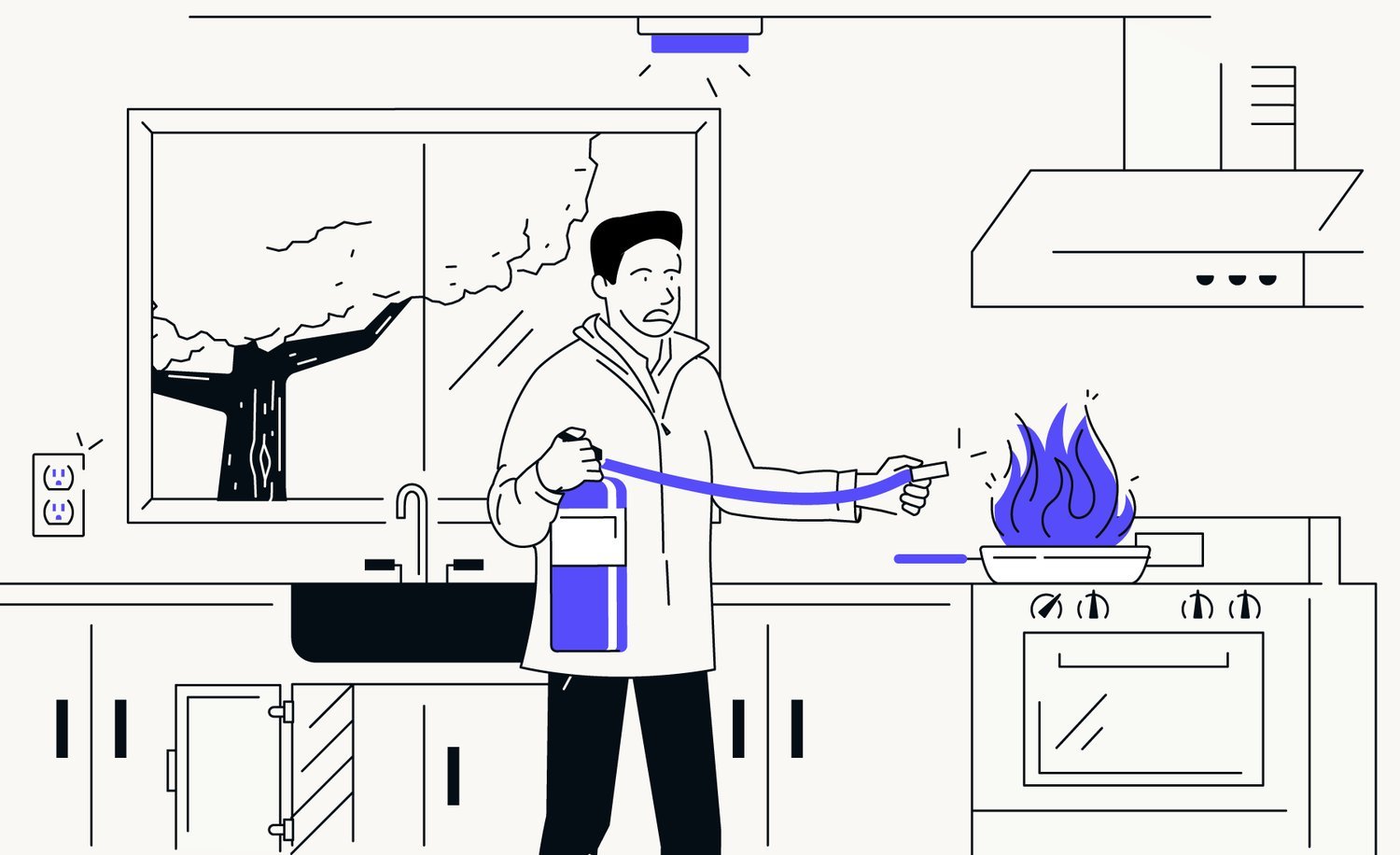Your heater smelling like gas could indicate a leak in the gas line or a malfunctioning burner. Having a heater that smells like gas can be alarming and concerning.
It’s essential to address this issue promptly to ensure the safety of your home and prevent any potential hazards. This article will explore the common reasons why your heater might smell like gas, the steps you should take to investigate the issue, and when to seek professional help.
By understanding the potential causes of the gas smell and taking appropriate action, you can ensure that your heating system is operating safely and efficiently. Let’s dive into the possible reasons behind the gas smell in your heater and how to resolve this issue effectively.

Common Causes Of Gas Smell From Heater
If you notice a gas smell coming from your heater, there could be several possible causes. It could be a sign of a gas leak, a malfunctioning pilot light, or a problem with the gas valve. It’s important to address this issue promptly to avoid any potential safety hazards.
Faulty Pilot Light
Mild gas smells from a heater can point to issues with the pilot light.Gas Leak From Connections
Loose or damaged connections can lead to gas leaks, causing a noticeable odor.Dirty Or Clogged Burner
Buildup on the burner can create a gas smell in your heater.
Credit: www.co2meter.com
Potential Dangers Of Gas Smell
If your heater smells like gas, it could be a sign of potential dangers. Gas leaks pose serious risks like fire hazards and health issues. It’s crucial to address this smell promptly to ensure safety and well-being.
Carbon Monoxide Poisoning
Carbon monoxide is a deadly gas that has no odor or color, making it extremely dangerous. Breathing in carbon monoxide can lead to serious health risks. Symptoms include headaches, dizziness, nausea, and confusion.
Fire And Explosion Hazards
Gas leaks can pose a significant fire and explosion risk in your home. When gas builds up and comes into contact with an ignition source, it can cause a sudden explosion. This can result in property damage, injuries, or even fatalities.
| Symptom | Description |
|---|---|
| Smell of Gas | A strong odor resembling rotten eggs |
| Hissing Sound | A hissing or whistling noise near the heater |
| Lightheadedness | Feeling dizzy or lightheaded when near the heater |
Remember: If you suspect a gas leak and notice any of these signs, evacuate the premises immediately and contact a professional technician for assistance.
- Gas leaks can lead to carbon monoxide poisoning
- Fire and explosion risks are heightened with gas smell
- Install carbon monoxide detectors in your home
- Regularly inspect and maintain your heater to prevent gas leaks
Steps To Identify And Address The Issue
If you notice a gas-like odor coming from your heater, it’s crucial to address the issue promptly to ensure the safety of your home and family. Follow these steps to properly identify and address the source of the gas smell.
Recognizing The Smell
If you detect a gas-like smell coming from your heater, immediately attend to the situation. Gas leaks can be hazardous and should be addressed promptly. Take a moment to identify the type of odor and its intensity. This will provide important information for diagnosing the issue.
Turning Off The Heater
As a precautionary measure, turn off the heater and any other gas appliances in your home. This step will help minimize the risk of a potential gas leak and ensure the safety of your household. Keep the area well-ventilated by opening doors and windows to allow the gas to dissipate. Once the heater is off and the area is ventilated, avoid using any matches, lighters, or electrical switches as a spark could ignite the gas.
Contacting Professionals
It’s essential to contact a qualified professional, such as a licensed HVAC technician or your gas utility provider, to inspect and address the issue. Attempting to troubleshoot or repair a gas-related problem on your own can be extremely dangerous. Seek assistance from experts who have the knowledge and experience to safely resolve the situation. If the smell is persistent, vacate the premises and contact emergency services or your gas provider immediately.

Credit: www.thezebra.com
Preventive Measures For Gas Smell In Heater
The distinct smell of gas coming from your heater can be alarming and potentially dangerous. To ensure the safety of your home and loved ones, it’s important to take preventive measures to address this issue. By implementing regular maintenance and inspection, installing carbon monoxide detectors, and ensuring proper ventilation, you can minimize the risk of gas leaks and keep your heater running smoothly.
Regular Maintenance And Inspection
Maintaining your heater on a regular basis is crucial to prevent gas leaks and associated odors. Here are a few maintenance tips to keep in mind:
- Keep your heater clean: Dust and debris can accumulate over time and impair the functioning of your heater. Regularly clean the exterior and internal components to avoid potential gas leaks.
- Check for damaged parts: Inspect the heater for any signs of wear and tear, such as cracks or loose fittings. Replace or repair damaged parts immediately to prevent gas leaks.
- Ensure proper ventilation: Make sure the air vents and exhaust pipes are clear of obstructions to allow for the proper flow of air. Restricted airflow can lead to the buildup of gas and the associated odor.
Installing Carbon Monoxide Detectors
Carbon monoxide is an odorless and colorless gas that can be produced when there is incomplete combustion in your heater. Installing carbon monoxide detectors in your home is an essential preventive measure. Here’s what you need to know:
- Choose reliable detectors: Select high-quality carbon monoxide detectors that meet safety standards. Ensure they have reliable battery backup and audible alarms.
- Strategic placement: Install detectors near your heater and in every sleeping area of your home. This ensures that potential gas leaks are detected early, giving you and your family sufficient time to evacuate.
- Regular maintenance: Test your carbon monoxide detectors frequently to ensure they are functioning correctly. Replace batteries as needed and replace the detectors according to the manufacturer’s recommendations.
Proper Ventilation
Proper ventilation is essential to prevent the accumulation of gas and the associated odor. Follow these guidelines to ensure adequate ventilation:
- Don’t block air vents: Avoid obstructing the air vents in your home, especially those near your heater. Allow unrestricted airflow to prevent gas buildup.
- Keep windows and doors open: When using your heater, open windows and doors to promote airflow. This helps to dissipate any gas that may be present and reduces the risk of gas odor.
- Consider professional evaluation: If you are unsure about the adequacy of your ventilation system, it’s advisable to consult with a professional HVAC technician who can assess and provide recommendations for improving ventilation.
Seeking Professional Assistance
As a homeowner, it’s important to be aware of any unusual odors coming from your heater, especially if it smells like gas. While a faint gas smell is common when you turn on your heater for the first time after a long period of inactivity, a strong or persistent smell can indicate a potentially dangerous issue.
Licensed Technician Services
If you smell gas coming from your heater, it’s crucial to seek professional assistance from a licensed technician. Gas leaks can pose serious risks, such as fire hazards and carbon monoxide poisoning. A trained professional will have the expertise to diagnose the problem and provide the appropriate solution, ensuring your safety and peace of mind.
When calling for licensed technician services, rest assured that they will follow a systematic approach to address the gas smell from your heater. Here’s what you can expect:
- Initial Assessment: The technician will begin by conducting a thorough inspection of your heater to identify the source of the gas smell. This may involve examining the ignition system, gas lines, burners, and other components.
- Detection and Repair: Once the problem is identified, the technician will proceed with the necessary repairs or replacements. This may include fixing faulty valves, seals, or connections that are causing the gas leak. They will ensure that all repairs are done according to safety standards and regulations.
- Test and Verification: After completing the repairs, the technician will conduct tests to verify that the gas smell has been eliminated. This may involve checking gas pressure, conducting a combustion analysis, and inspecting the ventilation system.
- Preventive Measures: In addition to addressing the immediate issue, the licensed technician may suggest preventive measures to avoid future gas leaks. This could include regular maintenance, such as cleaning and inspecting your heater, to ensure its optimal functioning and safety.
Gas Company Inspection
In some cases, it may be necessary to involve your gas company in the inspection process. This is particularly important if the gas smell persists after the licensed technician has performed their services. Contact your local gas company to report the issue and request an inspection.
The gas company inspection will typically involve:
- Gas Line Inspection: A qualified technician from the gas company will inspect the gas lines leading to your heater to determine if there are any leaks.
- Gas Pressure Test: The technician will perform a gas pressure test to ensure that the pressure is within the safe range and not contributing to the gas smell.
- Additional Safety Checks: The gas company technician may conduct further safety checks, such as inspecting the meter, evaluating gas appliances in your home, and providing recommendations to enhance safety.
- Resolution and Guidance: Based on their findings, the gas company technician will advise you on the necessary steps to resolve the issue and ensure continued safety.
Remember, when it comes to gas smell from your heater, it’s always better to be safe than sorry. Seeking professional assistance from licensed technicians and involving your gas company in the inspection process is crucial in ensuring your family’s safety and avoiding potential hazards.
:max_bytes(150000):strip_icc()/reasons-gas-water-heater-not-working-5212987-hero-fe6b82a59053421c88b7d13ea311d3c5.jpg)
Credit: www.thespruce.com
Frequently Asked Questions For Why Does My Heater Smell Like Gas
Why Does My Heater Smell Like Gas?
If your heater smells like gas, it could indicate a gas leak, a dirty burner, or a faulty ignition. It’s important to address this issue promptly for safety reasons.
Is It Normal For A Heater To Smell Like Gas?
While it’s common for a gas heater to emit a slight odor upon startup, a strong gas smell can indicate a problem that needs immediate attention. Ignoring it can be dangerous.
What Should I Do If I Smell Gas From My Heater?
If you smell gas from your heater, turn off the unit, open windows for ventilation, and evacuate the area. Call a professional HVAC technician to inspect and repair the issue.
Can A Gas Leak From A Heater Be Harmful?
Yes, a gas leak from a heater can be harmful as natural gas is highly flammable. It can lead to fires, explosions, and carbon monoxide poisoning. Prompt action is crucial.
How Can I Prevent My Heater From Smelling Like Gas?
To prevent gas smells, ensure regular maintenance and cleaning of your heater, including burner inspection and cleaning. Regular professional checks can identify potential issues before they worsen.
Conclusion
If you notice a gas smell from your heater, take immediate action. Ignoring it could lead to dangerous situations. Schedule a professional inspection to identify the source of the odor. Regular maintenance and prompt repairs will ensure safe and efficient heating for your home.
Stay informed and proactive about your heater’s condition to maintain a healthy living environment.